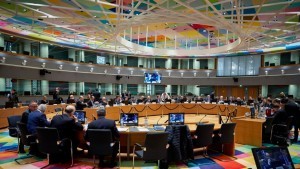The implementation of economic measures will continue after the completion of the current Greek bailout programme, according to the institutions at the end of Friday’s EuroGroup meeting.
The institutions informed the Eurogroup of progress made on the ongoing fourth review of Greece’s financial assistance programme. Minister Tsakalotos presented Greece’s forthcoming comprehensive growth strategy, outlining goals and priorities for the coming years.
Ministers were also briefed on the key topics that are relevant to the successful completion of the programme. They were informed on the technical work that has been done to date on the growth adjustment mechanism, as part of the possible medium-term debt measures for Greece. They also discussed the possible form that the post-programme framework could take.
EuroGroup president Mario Centeno remarked on Greece: “On Greece, we had a productive discussion. We saw some good news from Greece lately, namely on the fiscal side. For the second consecutive year, Greece delivered a primary surplus over 4% of GDP and a budget surplus. This is very encouraging given the track record. On the programme, Greece remains fully committed to the reform agenda. We got good feedback from the institutions regarding the implementation of the fourth and final review of the programme. I’m happy to announce that the institutions will return to Athens on the 14th May for their next mission. This is good news. Ahead of the May Eurogroup, the institutions and the Greek authorities will work towards an agreement on all policies that need to be implemented for the final review – the so-called staff level agreement. With the programme well on track and approaching the end, we are already preparing the post-programme period. Today, the Greek Minister presented the growth strategy of Greece for the coming years. The strategy is to boost Greece’s long-term growth potential and enhance the investment climate. Importantly, it underlines Greek ownership of the reform process beyond the end of the ESM programme. This exercise is key for the future of Greece. On the back of our experience in other programme countries – namely in the country I know best – ownership is critical for the sustainability of the current economic recovery in Greece. Lastly, we also addressed the post-programme legal framework to prepare for a successful exit from the programme this summer. The final decision on the implementation of the debt measures will be taken, if needed, at the end of the programme, conditional on full implementation of the programme, of course. We also discussed how we can further support the Greek authorities in their continued reform efforts in the years after the programme. We took note of the intention of the Greek government not to request a successor arrangement. On the future monitoring of the economic, fiscal and financial developments, the Eurogroup took note of the so-called ‘enhanced surveillance’, as proposed by the Commission. We will now continue discussions on these issues in the weeks ahead, also on the debt strategy. On the basis of a successful review, the Eurogroup will decide in June all the elements that can help facilitate the exit of Greece from the programme by August.
On his part, the Commissioner for Economic and Financial Affairs, Taxation and Customs, Pierre Moscovici said: “The Implementation must continue after the program and that is why we need a monitoring mechanism. We need sound budgetary choices because this is an important point of confidence from the markets”.
Ask me anything
Explore related questions





